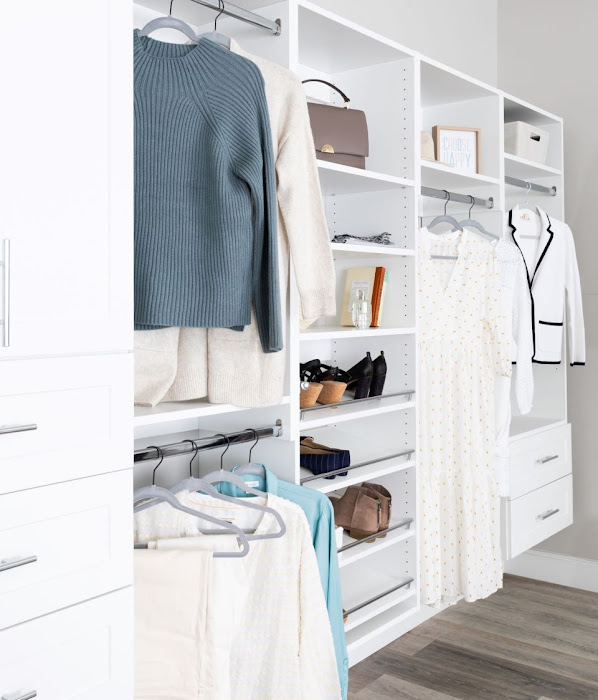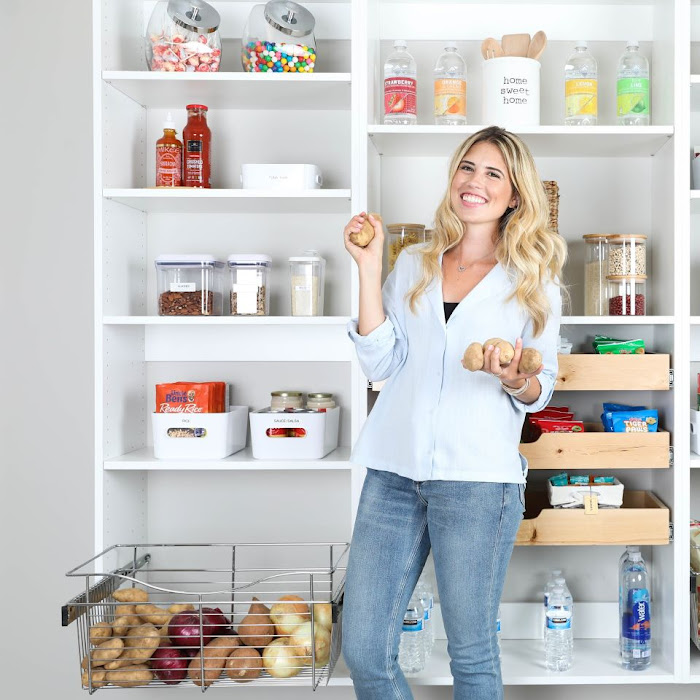Get All the Storage Spaces in Your Home Organized
Happy Friday dear readers! Have you missed me as much as I've missed you? I took some much needed time off to recharge my batteries so I could come back refreshed and ready to share all kinds of fun and creative ideas with you. I'm not "officially" back until Monday, so today I'm sharing a guest post from organization expert with Modular Closets, Marty Basher. I hope you enjoy her insightful ideas and tips on how to get all the storage spaces in your home organized during National Homeowners Month. Even if you aren't a home owner yet, this will help you get your space organized.
Let's Get Organized!
My thanks to Marty Basher, the design and organization expert with Modular Closets for sharing her tips with us today. No compensation was given.
June is National Homeowners Month- By Marty Basher:
From the Kitchen Pantry, Linen Closet and Laundry Room to the Bedroom and Bathroom, Getting Your Storage Areas Organized Is a Great Way to Get More Enjoyment Out of Your Home.
Since it’s National Home Ownership month, this is a good time to be looking at home improvement projects. If you are thinking about doing some remodeling or even just sprucing up your house this year, it’s really valuable to include storage spaces and closets in your plans. And we’re not just talking about the bedroom closet, almost every space in your home has some sort of storage to consider. Better organization of your belongings throughout your house equals a happier homeowner!
If you think about it, you’ve probably spent more time moving things from one closet to another, or even wasted a lot of time looking for something—a scarf, a bag, a shoe—that, if it just had the right home inside your house, you’d be able to find it every time you needed it.
The key to cleaning up your home and staying organized is to maximize your use of your closet systems and storage areas. Everything in your house should have a designated “home” so that everyone knows where to find what they’re looking for. Here are some tips for every closet in your home—from the mudroom to the bedroom, the pantry and the bathroom cabinet—that you can put into action today!
First, take stock of your current closet or storage design and layout:
One closet space at a time, go through what’s in it and do a triage: things that need to stay, things that need to be stored elsewhere, things that can be donated, and things that need to be thrown out. If you dig deep enough in any closet, you’ll find things that have been in there since you moved in! It’s time to go through it all and be honest about what you want to keep and where.
While you’re looking at what’s in your closet, check out the closet design. It has to be functional but it can also be fabulous! For example, if you have a habit of buying Jimmy Choo shoes in bulk, having a gorgeous shoe rack or shelves would be ideal, right? Consider changes you can make to each closet to maximize the benefits of the space, given what each contains.
Tips for Each Closet Space in Your Home:
The bathroom cabinet—
- The best option in this space is to only keep what you need every single day: medications, shampoo and conditioner, makeup, and so on. This goes for the shelving in the bathroom as well. The less you clutter up that space, the better. Magnetic strips on the inside of the door are perfect for nail scissors, tweezers and bobby pins.
- Items like extra towels, shampoo, toilet paper and so on, are best stored on a shelf in a linen closet or other storage area outside of but near to the bathroom.
- If your bathroom cabinet is too tiny for even the basics, a hanging plastic shoe organizer on the back of the door might be the ticket for storing all the smaller items.
The linen closet—
- In addition to sheets and towels, the linen closet is the perfect place for all the extras of items that you purchase for your family, including toothpaste, shampoo, soap and so on. This way, everyone knows that when something runs out in the bathroom, there’s somewhere to go to find more. Use plastic baskets to keep everything organized and tidy.
- For bedding, put a set (fitted sheet, top sheet, shams) in one of the pillow cases from the set, so that changing the bed is a matter of pulling out a case and having everything needed, all tidy.
- It also makes it easier to keep a running tally and know when it’s time to stock up on something that your family uses regularly. Running out of TP is no laughing matter!
The laundry room—
- Installing some high cabinets or shelving in the laundry room makes good sense for a couple of reasons: it keeps dangerous items out of reach of small hands and it keeps everything you need for cleaning your entire home ready and at hand. If you can, store your vacuum and/or floor steamer in the same space, as well as the accessories, extra bags and cleaners.
- Adding some hooks or even hanging shoe racks in a laundry room closet makes it easy to store accessories for all your cleaning appliances, as well as brushes and brooms, keeping them off the floor.
The mudroom—
- If you have the space, creating a “zone” for each member of the family is ideal. That could include a set of hooks for jackets and hats or scarves; a basket for mittens and gloves in winter; a rack for seasonal shoes.
- Make sure there is ample space for placing muddy or wet footwear and a nice addition is a laundry basket. Anything that got dirty outside can be placed directly into it, for easy identification and transport to the laundry room.
- Ideally, you’ll have a space elsewhere in the house—the basement or garage come to mind—where you can set up off season storage areas. With every season, you can switch out what is stored in the available space of the mudroom.
The hallway / front entrance—
- Typically, a front hall closet will be smaller than a mudroom space, so individual ‘cubbies’ might not be an option. Plus it’s a good idea to leave some space to hang up jackets for visitors.
- Include an umbrella stand, so that they can drain without messing up the floor.
- Shoe racks are essential here to keep items off the floor. Make use of hooks for scarves, hats and purses too.
The kitchen pantry—
- A triage of old items is particularly important in this space, to make sure you’re not holding on to the spice your mom brought home from her honeymoon in Tuscany, 30 years ago!
- Grouping items in the pantry for ease of location and keeping a tally for restocking makes sense: soup with soup, canned veggies with canned veggies and so on.
- A spice rack, if there isn’t room in the kitchen cabinetry proper, is ideal and this is also a good place to store extras of dry goods, including flour, sugar and so on. Items you might not use every single day but that you want to have at the ready and easy to find.
The family room / playroom—
- Clutter is what kills rooms that we live in, so making sure you leverage any closet or storage spaces in these rooms to put away things that don’t need to be out and on display is appropriate.
- For dens and living rooms, furniture that doubles as storage is practical and pretty, allowing you to put away games and extra blankets: out of sight but easy to access.
- For playrooms, shelving with buckets are particularly helpful to get even little kids involved in keeping the space relatively tidy. Each bucket can hold specific items and even a child in kindergarten can figure out where to put them.
- A closet or shelving for storage in either space is ideal for storing the items that aren’t used regularly.
The bedroom closet—
- Finally, the bedroom needs to be a space that is comfortable and calming, whether for the 4 year old or the 45 year old! Using closets and other storage to avoid clutter is essential.
- For younger children, making some closet rods and shelves accessible to them starts them on a path of putting things away properly. Using bins on the shelves, or drawers, can help keep things tidy.
- For the adults, it’s important to group clothes in a way that is logical: either by color, or by outfit, or by usage. For example: all the workout clothes in one spot, all the office attire in another. The point is to be able to find what you’re looking for without digging.
- Keeping things off the floor with hooks, shelves, drawers and rods ensures that everything in your closet is properly put away.
After you’ve organized everything, it’s a matter of keeping on top of it. Switching out items on a seasonal basis and keeping track and tally on items that get used up and need to be repurchased will help you keep organized in space and in life!
Thanks again to Marty for her helpful tips. I've been working on overall decluttering this month and it is my goal to have my pantry clean, well lit and organized before fall. If you've been inspired by this post, but feel like you may need professional help, here's more information about Marty and her services with Modular Closets:
Marty Basher is the design and organization expert with Modular Closets, https://www.modularclosets.com. Marty regularly contributes on topics of DIY renovations, home design, organization, improvement and more, helping home owners get the most of the spaces in their home. Modular Closets are high-quality and easy-to-design closet systems made in the USA that you can order, assemble and install yourself, in no time at all. Using closet modules (closet pieces you can mix & match to design your own modular closet), homeowners everywhere are empowered to achieve a true custom look- for nearly 40% less than standard custom closets.
Please share in comments: Which part of your home would you like to get organized first?





